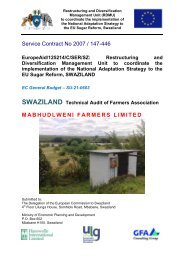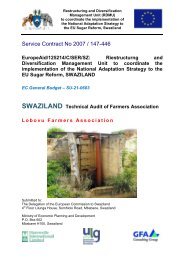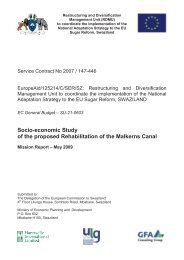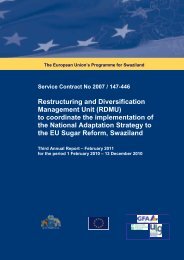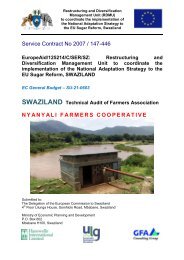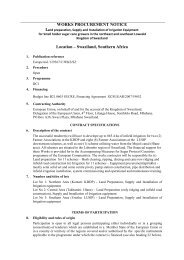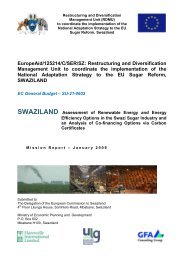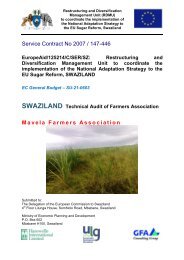Service Contract No 2007 / 147-446 Strategic ... - Swaziland
Service Contract No 2007 / 147-446 Strategic ... - Swaziland
Service Contract No 2007 / 147-446 Strategic ... - Swaziland
- No tags were found...
You also want an ePaper? Increase the reach of your titles
YUMPU automatically turns print PDFs into web optimized ePapers that Google loves.
As was noted in the scoping report, the NAS failed to identify water and its management as apotential issue that could adversely affect the viability of all cane growers in the future. <strong>No</strong>activities or resources have been allocated to strengthening water management structures.5.2.4 Options to address the key aspectFrom the consultations and review of available literature, the increasing threat of climatechange not only on water resources but on all aspects of cane production including increasesin crop water requirements brought about by increasing temperatures and evaporativedemands, requires an urgent and meaningful assessment. Even excluding the effects ofclimate change on water availability, the country is already facing severe challenges inmeeting its water requirements due to increasing use of available water for non-irrigationpurposes, i.e. domestic and industrial consumption.There are several options available to address the water and climate change issue:−−−−−−−−The irrigation sector is highly exposed to climate change so it imperative that urgentaction is taken to identify impacts and relevant adaptation strategies, throughundertaking a climate change impact assessment of the irrigation sector. If theeffect and predicted impacts of climate change on water resources are correct, thendetailed assessments of the significance, scale and scope of the impact need to beinvestigated and mitigation strategies formulated to ensure the sector continues toprovide its multitude of socio-economic benefits.Undertake an evaluation of hydrological data systems to identify the gaps ininformation and measurement. The paucity of accurate and reliable information onthe availability of water within the basins is a significant challenge to managing theresource in a sustainable and equitable manner. Flow measurement and abstractionrates are not fully understood and resources are needed to improve this knowledgegap to enable technically sound management decisions can be made on allocations.Investigate ways to encourage irrigators to use water more efficiently throughchanges in their irrigation equipment and practices (surface to sprinkler to drip),improvements in the distribution of water (line unlined canals), improvements in thescheduling of irrigation with site specific recommendations and assist RBAs and theDWA with improving their flow measurement structures, reporting and datacollection.Assistance is required to help the RBAs develop basin management plans that willprovide information on sustainable water allocation, which in turn will help the overallwater management expectations of FAs and large schemes. The lack of basinmanagement plans and detailed technical assessments of water availability meansthat water permits may not be issued.RBAs need to review the draft IWRM Plan to ensure relevance andappropriateness of the plan to their mandated responsibilities.Dam owners or operators to assess the scope to increase water storage toaccommodate climate change seasonal variations.The GoS, RBAs and others to support where possible greater use of on-farmwater storage structures to increase water security on the farm.In light of decreasing river yields and increasing water demand, strategies forincreasing water use efficiencies must be developed by all water users. RBAsand others need to increase water users’ awareness of the importance of waterefficiencies and the methodologies to achieve water savings.RDMU (<strong>Strategic</strong> Environmental Assessment of the National Adaptation Strategy) - Page 51



